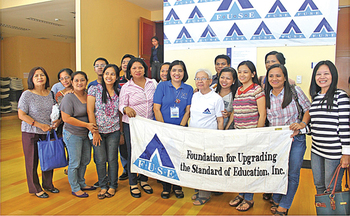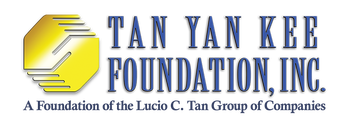
The Foundation for Upgrading the Standard of Education (FUSE) held last September a five-day training for teacher-trainers in the subject areas of Chemistry, Integrated Science, Physics, Mathematics, and English.
The course was a partnership between FUSE, as the delivering organization, in cooperation with the Philippine Science Consortium.
The course was a partnership between FUSE, as the delivering organization, in cooperation with the Philippine Science Consortium.
Each course had its own specific objectives designed to raise the competence of teachers in Science, Mathematics, and English subjects, while earlier FUSE courses focused on training Science and Mathematics teachers on content and methods. Specifically targeted for training were future Trainer-Teachers for future teachers. Because of this focus, the participant-attendees in each program were generally small in number compared to the regular direct training of subject teachers. 105 teachers were trained, grouped as follow:
The five-day program started with an introductory session held at the FUSE Auditorium that clarified the common goals of the courses as well as to get all participants to realize the significance of beginning with a common prelude to training future trainers.
The session, which followed was a break-out for each group’s specific subject focus. For all five courses, a pre-test was given to assess where the participants currently stand and to give them indicators on coverage of concepts, subjects, thrusts, aims that are emphasized. In three of the five courses, outside experts involved in expanding the scope of the courses beyond the usual coverage and who are nationally-recognized experts handled the training.
Focus on up-to-date knowledge was addressed and given more time than usual through questioning techniques, discussion, presentation, verification, reflection and hypothesis formulation—giving them more depth, breadth, and open discussion. Added to these approaches was viewing of video episodes from the FUSE collection of IT-oriented materials.
A post-test complemented pre-test toward the fourth or fifth day to assess the key learnings, particularly with regard to teaching methods and techniques.
At the end of the five-day program, a joint session for all five groups was held, which capped the training by drawing out from the participants their impressions of the training course. Evidently, the effort is worthwhile for repeating in 2014. An evaluation of the impact of this model of training is also strongly recommended by FUSE through follow-up on the trainees.
- Chemistry 21
- Integrated Science 18
- Physics 17
- Mathematics 25
- English 24
The five-day program started with an introductory session held at the FUSE Auditorium that clarified the common goals of the courses as well as to get all participants to realize the significance of beginning with a common prelude to training future trainers.
The session, which followed was a break-out for each group’s specific subject focus. For all five courses, a pre-test was given to assess where the participants currently stand and to give them indicators on coverage of concepts, subjects, thrusts, aims that are emphasized. In three of the five courses, outside experts involved in expanding the scope of the courses beyond the usual coverage and who are nationally-recognized experts handled the training.
Focus on up-to-date knowledge was addressed and given more time than usual through questioning techniques, discussion, presentation, verification, reflection and hypothesis formulation—giving them more depth, breadth, and open discussion. Added to these approaches was viewing of video episodes from the FUSE collection of IT-oriented materials.
A post-test complemented pre-test toward the fourth or fifth day to assess the key learnings, particularly with regard to teaching methods and techniques.
At the end of the five-day program, a joint session for all five groups was held, which capped the training by drawing out from the participants their impressions of the training course. Evidently, the effort is worthwhile for repeating in 2014. An evaluation of the impact of this model of training is also strongly recommended by FUSE through follow-up on the trainees.
